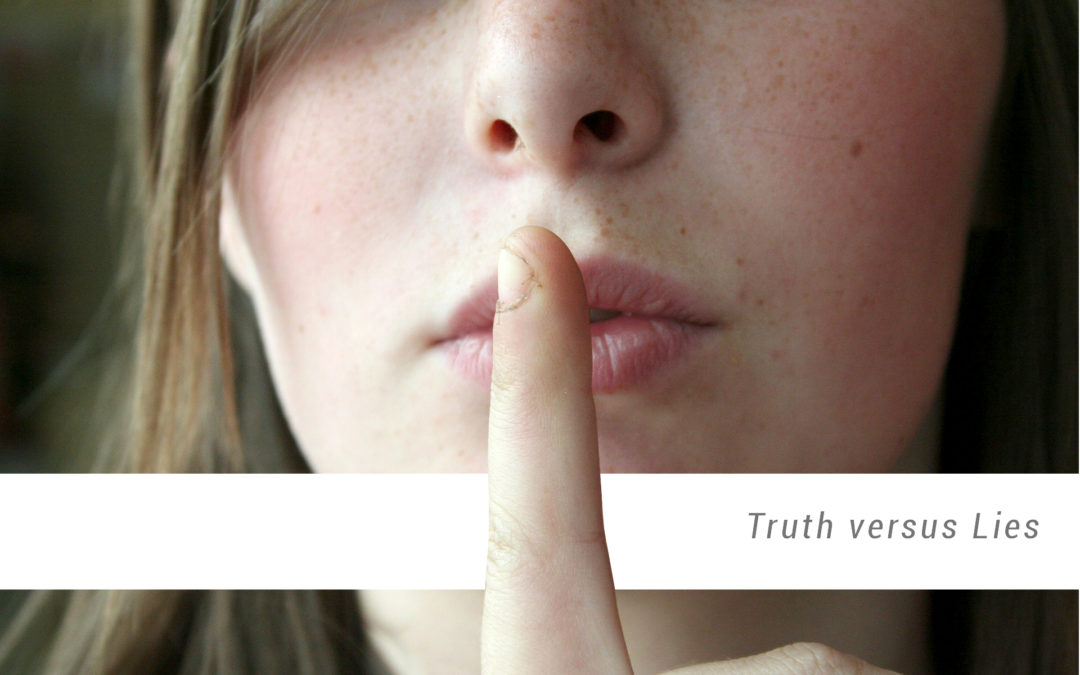Do you tell yourself slightly embellished or false stories to try and feel better? Do you feel you need to survive situations and maintain some sense of dignity and worth? Are you afraid of hurting others feelings?
If so, you may be telling little white lies to get through the day. Let’s examine some of the techniques we usually use. Discover your own pattern and determine whether or not it is serving you well.
Creative Thinking
Found yourself in a situation and you think it is better to make up a story rather than cause an argument by telling the truth? In such a case you might say:
- “I’m late because there was so much traffic.”
- “Someone called just as I was leaving.”
- “My clock didn’t rang to the alarm.”
Whatever the story is, we know that it is not true. But we think it will help us save face. Sometimes it might, but sometimes, the listener can see right through our story because our verbal and non-verbal behavior are not congruent.
Half Stories
Do you watch what you say and omit critical details to avoid the truth? You think it’s best only to tell them:
- the bare details
- answers to their specific questions, or
- some of the details because others are none of their business.
When we tell only parts of the story, we are usually hiding something. For example, John told his wife that he was on annual leave for three days, but he was actually suspended from work for misconduct. KJ told everyone that he was on a health food craze, and shouldn’t go to the staff social because there wouldn’t be anything he could eat. The truth was he actually didn’t want to go to the staff social.
There are times when we remain silent. It doesn’t matter what we choose to do; what matters is how it plays on our mind and how we have to make sure we don’t let vital pieces of information slip in the future. How do you feel about people when you find out they only told you one-half of a story?

It’s My Secret
Many people and families have lies or secrets they will take to the grave with them. These things may be weird, upsetting, considered unacceptable to our family or among our friends, or just awkward.
If the secret is killing you, it is important to find a person who can help you put it in perspective, ensure the story is accurate, and deal with the emotions and turmoil in your mind.
Improving the Story
Do you improve your stories by adding details or your interpretations? Many of us are prone to exaggeration or embellishment. It makes our story seem more interesting, captivating or important. We want to impress, be accepted or seem very understanding of others.
It makes it awkward if we don’t remember the same details each time we tell the story. In truth, it only makes us feel better in the moment, but not afterwards.
Diminishing Details
Do you eliminate details so that you don’t feel as if you are self-centered or as if you are boasting? Do you undersell the significance of events? Are you afraid of making yourself seem smarter or better than someone else?
The truth is that you cannot make anyone feel anything. Other people have a choice on how they react to anything you say or do. It is essential to be more tuned into what your internal truth is rather than refraining from telling the whole truth in exchange for acceptance or peace with others.
Part of the Story
We tell only part of the story when we want to be misleading. I remember talking to a person who belonged to a book club with colleagues. She only read the first and last chapter of each book and any reviews posted online. But when she would attend the sessions and someone asks her what she thought, she would say, “Well when I read the book I thought…,” rather than saying, “I only read the first and last chapter and online reviews.”
I also remember talking to a person as we sat in an airport and they were asking me about my destination. They told me they had been there several times, and I began to ask questions.

When we were talking for about 20 minutes, I asked how much time they spent there each visit. After red faces, some stuttering and looking down at their shoes, I discovered they had only been in the airport and had never actually visited the city.
No Fight Here
Do you lie to avoid a fight with family, friends or colleagues? Will you sell your soul to avoid hurting someone’s feelings? If you are, you are not alone. You may lie about knowing or being someone’s friend, knowing details that you don’t want to reveal, or facts that you think are best left unrevealed.
Many of us do not want to be involved in any form of confrontation. We will go a country mile to avoid any discussion or debate that makes us feel uncomfortable. When we find ourselves in these situations, it is vital to find a coach to learn the skills that enable us to be honest.
There are many ways to avoid telling the truth. Many of us judge others when they lie, but we justify our lies, too. We are all imperfect. Be kind to yourself and others.
We are our best selves when we allow others to tell their truth while refusing to let our brains be the judge and jury. We accept what is and enable others to learn and move forward with their lives. We liberate them from torment and let them know that failure is normal. We know that if we are a safe place for others, they will also be a safe place when we need one.
Do you want to
- reduce stress and achieve harmony in your personal and professional life?
- be a more effective and efficient leader in your workplace?
If you want to be on top of your game, then you will benefit the most from coaching.
I am offering a free 20-minute consultation to help you decide which coaching package is best for you. Click the button below to schedule a call.

Dr. Brenda Kelleher-Flight


